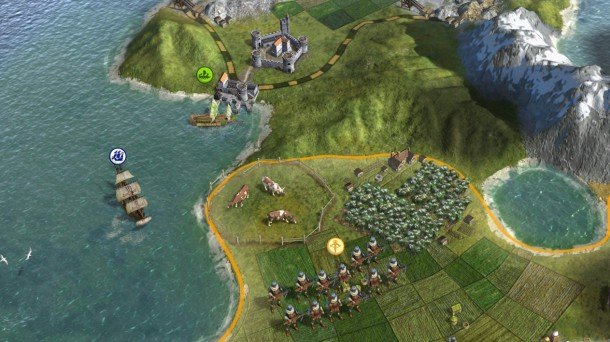
Civilization V's second and final major expansion, Brave New World , is promising to bring more depth and diversity to the endgame on July 9. Lead Designer Ed Beach recently spoke with Revision 3 , going into detail on some of the systems we've seen glimpses of in the past. We grabbed some of the more interesting new details, and set our worker units to build a Handy List improvement in the space below.
Portugal
- Portugal, one of the new civs being introduced, is master of exploration and trade. Their unique unit, the Nao, has a one-time trade ability that allows them to sell luxury goods in foreign territory for a gold payout. The amount of gold is based on the trade location's distance from your own borders.
- The Portuguese unique improvement is the Feitoria. It can be built in the territory of any city-state (even a hostile one, if you have the forces to protect your workers while they build it). Once constructed, it will give you access to a copy of every luxury resource that city-state controls.
Trade
- The new Cargo Ship units are used to establish trade routes between coastal cities. Creating domestic trade routes will produce production or food. International trade routes with other civs will produce gold, as well as science for whichever trading partner is less advanced. Religious pressure also spreads along trade routes.
- The amount of gold generated from an international trade route is based on the difference in luxury resources at both ends. Two cities that both have gold and spice would not create a lot of profit, trade-wise. But a city with gold and spice trading with a city that has silk and pearls would be very lucrative.
- Domestic trade routes will be a good way of getting food or production to distant colonies that can't produce a lot on their own, initially.
Archaeology
- The archaeology sites we've heard about previously can be turned into a permanent landmark with an ongoing benefit, or broken down for a one-time boost.
- Archaeology digs can be constructed anywhere your units have access to, but dig sites in foreign territory will upset the civ that owns the land.
- A new policy tree, Exploration, can unlock a secondary set of hidden archaeological sites for the first civ to reach the end.
World Congress
- The first civ to meet every other civ on the map will found and host the World Congress.
- Your number of delegates at the World Congress will change as the eras progress. The host civ always gets a bonus to the base number, but eventually, every City-State you have as an ally will give you additional delegates.
- The purpose of the World Congress is to change the rules of the game. Only two civs will be able to propose resolutions for everyone to vote on: the host civ, and one other determined by criteria that was not revealed.
- Some example resolutions include trade embargoes, banning specific luxury goods (such as whales), imposing a tax on all standing armies, and a shared World's Fair. The World's Fair is a shared wonder that all civs can contribute production to. Once completed, rewards will be granted based on each civ's level of contribution.
- Any civ that can propose a resolution can also motion to repeal a previous one.
- There is a special sub-set of resolutions that cannot be proposed by any civ. Rather, they will automatically be put up for a vote when certain technological milestones are reached. These include changing the host of the World Congress (regularly recurring), building an International Space Station shared wonder, and enacting bans on nuclear proliferation.
- One such resolution is naming a World Leader, which is the trigger for Diplomatic Victory. This vote comes up at the World Congress on regular intervals once someone constructs the United Nations (at which point the World Congress is renamed as the UN).
Other
- The Freedom, Autocracy, and Order ideologies (formerly just represented by Policy trees) are now mandatory. Once you research Industrialization, you will be forced to pick one of the three. Each one lends itself to three of the four victory conditions (military, diplomatic, cultural, and science) and locks you out of the fourth. It also has a stronger effect on who your friends and rivals will be from the Industrial Era forward.
Be sure to check out our hands-on preview for more on Brave New World, as well as our interview from the announcement .
Keep up to date with the most important stories and the best deals, as picked by the PC Gamer team.
Len Hafer is a freelancer and lifelong PC gamer with a specialty in strategy, RPGs, horror, and survival games. A chance encounter with Warcraft 2: Tides of Darkness changed her life forever. Today, her favorites include the grand strategy games from Paradox Interactive like Crusader Kings and Europa Universalis, and thought-provoking, story-rich RPGs like Persona 5 and Disco Elysium. She also loves history, hiking in the mountains of Colorado, and heavy metal music.

